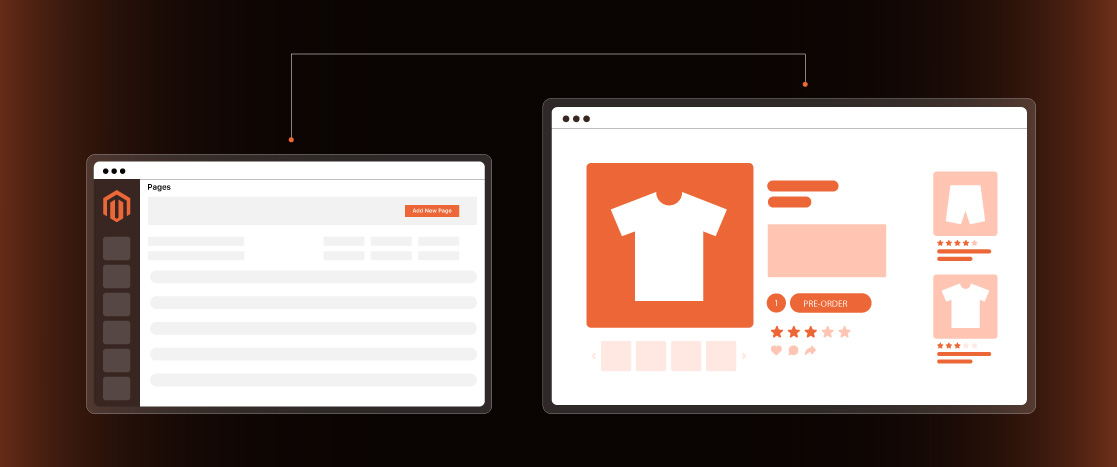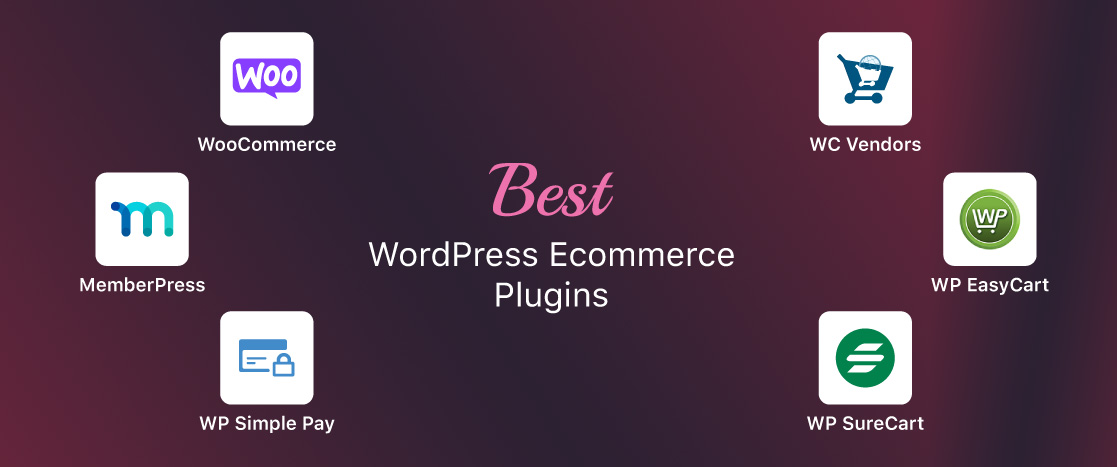
Best Ecommerce Platforms of 2024 for Building Online Stores
Finding the best ecommerce platform is essential to the success of your website. Everything from a simple user interface to the capacity to expand your business and manage your store will be provided by the platform you select. We’ll look at a few of the best ecommerce systems out there right now.
We’ll provide guidance on how to pick the best ecommerce platform to support your task.
How to Pick the Best Ecommerce Platform for Your Business
Selecting the best ecommerce platform for your task requires a careful assessment of your unique business requirements and objectives. To begin, determine the nature of your product catalog along with necessary including support for multiple stores or proficient SEO skills.
Then, think about the platform’s scalability to make sure it can grow with your business, as well as the upfront and ongoing costs, balancing your budget against the functions that you need.
Finally, think about the technical knowledge required to operate the platform, with options that include beginner-friendly solutions like WooCommerce to technically robust platforms like Magento.
Finally, check that the platform connects smoothly with your current systems and tools, such as payment systems and campaigns for marketing, in order to improve operations and increase productivity. By carefully examining these features, you may find the best ecommerce platform that fits in with your business values and promotes growth.
Define Your Needs
The first step in choosing the best ecommerce CMS platform is to define your business requirements and goals. Consider the size of your product catalog, the expected volume of traffic, and specific features. This helps narrow down your options and ensures the platform can meet your needs.
Consider Scalability
It’s tricky to choose an ecommerce CMS that can grow with your business. Evaluate each platform’s scalability to ensure it can handle increased traffic and a larger product catalog as your business expands. By carefully studying the aspect of scalability, you can future-proof your investment and avoids the need for a costly platform change later.
Budget and Cost
Evaluate the initial and long-term costs associated with each platform. Some may have lower upfront costs but require expensive extensions or ongoing maintenance fees. Consider your budget to choose a platform that offers the best value for your investment, balancing cost with necessary features.
Technical Expertise
Study the technical skills required to manage and customize the platform. Platforms like Magento demand significant technical expertise, while others like WooCommerce are more user-friendly. Ensure you have the necessary resources to effectively manage the platform you select.
Support and Community
Access to support and an active community is crucial for troubleshooting and maximizing your platform’s potential. Evaluate the support and community resources available for each platform, as a strong support network can significantly ease the management of your ecommerce CMS.
Integration Capabilities
Ensure the platform can integrate with your existing systems and tools, such as payment gateways, shipping providers, and marketing tools. Strong integration capabilities save time and effort in managing your store, providing a smoother operational experience. Also, check for APIs that can be used later to extend capabilities.
Magento: Power and Flexibility for a Top Ecommerce Platform
Magento is a popular ecommerce platform known for its powerful features and flexibility. It is extensively utilized by businesses of all sizes who need an affordable and customizable service. Magento has two main versions: Magento Open Source (previously called Magento Community) and Magento Commerce (formerly Magento Enterprise).
Magento Open Source (or just “Magento”) is a free-of-cost, community-supported version that has a robust set of functionalities out of the box. Magento Commerce (or “Adobe Commerce”), on the other hand, is a paid edition with more features and support, specifically built for applications that demand expanded functionality, improved performance, and specialized assistance.
Magento is renowned for its extensive feature set, which includes:
- Scalability: One of Magento’s standout features is its ability to handle large volumes of products and traffic. The platform can easily scale from a small online store to a massive ecommerce operation without compromising performance.
- Customization: Magento’s modular architecture and extensive library of extensions allow businesses to tailor their stores to their specific needs. Magento provides the flexibility to create a store that perfectly aligns with your business requirements.
- Robust Security: Security is a top priority for any ecommerce platform, and Magento delivers with strong security features. These include regular updates and patches to protect against vulnerabilities, and robust user authentication protocols.
- SEO Capabilities: Magento comes with built-in SEO features that help businesses optimize their stores for search engines. All designed to enhance your store’s visibility in search engine results and drive organic traffic.
- Multi-Store Management: Magento offers multi-store management from a single backend. This feature allows you to manage multiple online stores with different domains, product catalogs, and pricing strategies, all from one unified admin interface.
Pros
- B2B Functionality: Integrate with customer relationship management (CRM) systems to enhance marketing strategies. Create custom catalogs for different companies. Manage quote requests with built-in features.
- Advanced Search Engine Optimization (SEO): Modify URL paths to make them more user-friendly. Auto-generate your sitemap to boost search engine rankings.
- Extensive Analytics: Gain insights on sales, taxes, search terms and refunded sales, and other critical metrics. Use these insights for improved decision-making.
Cons
- Limited Customer Support: Free users must rely on the platform’s knowledge base, documentation, and community forums for help.
- Requires Technical Expertise: Installation and customization require technical expertise. Users may need additional resources or tutorials to fully understand the platform’s capabilities.
Ideas Use Cases for Magento
It’s perfect for businesses that need advanced SEO and marketing tools to enhance their ecommerce store. Additionally, Magento is ideal for organizations that prioritize high security and performance, particularly those managing multiple stores or large product catalogs.
- Large Enterprises with Complex Needs: Magento is ideal for large businesses that require extensive customization, scalability, and the ability to manage multiple stores and large product catalogs.
- Advanced SEO and Marketing Tools: Magento provides robust SEO and marketing features, making it perfect for companies that need to optimize their online presence and drive targeted traffic.
- High Security and Performance: With its strong security features and the ability to handle high traffic volumes, Magento is best suited for businesses that prioritize data protection and top-tier performance.
WooCommerce: A Smooth Integration for WordPress Users
WooCommerce is a powerful ecommerce plugin for WordPress, making it a good option for businesses who currently use WordPress for their online presence. WooCommerce is widely regarded as the best platform for ecommerce websites, particularly by individuals who enjoy their knowledge of WordPress.
Key features of WooCommerce include:
- Easy Integration with WordPress: WooCommerce seamlessly integrates with WordPress. This integration ensures that users can maintain the same interface and functionalities they are familiar with while adding robust ecommerce capabilities.
- Flexibility: WooCommerce offers numerous extensions and themes to customize your store. WooCommerce’s flexibility ensures that you can tailor your store to meet your specific business needs.
- Cost-Effectiveness: WooCommerce itself is free, making it one of the best open-source ecommerce platforms available. While some extensions and themes may come at a cost, the overall investment remains significantly lower compared to other proprietary solutions.
- SEO-Friendly: Built on WordPress, which is known for its SEO capabilities, WooCommerce inherits these strengths. This CMS for ecommerce ensures that your online store is optimized for search engines.
Pros
- Easy to Use and Set Up: WooCommerce is designed with user-friendliness. Its built-in interface and seamless integration with WordPress make it easy for beginners to set up and manage their online stores.
- Cost-Effective: Being a free plugin, WooCommerce offers a cost-effective solution for businesses. Even with the purchase of premium extensions and themes, it remains an affordable option compared to other ecommerce platforms.
- Customizable: With a large library of extensions and themes, WooCommerce allows you to customize your store to fit your exact needs.
- Strong SEO Capabilities: WooCommerce benefits from WordPress’s strong SEO foundation, helping your store achieve better visibility in search engine results.
- Large Support Community: The extensive community of WooCommerce users and developers provides a robust support system.
Cons
- Scalability Issues: WooCommerce may face scalability issues with very large stores. As your store grows, you might encounter performance challenges that require additional optimization and resources.
- Relies on WordPress: Since WooCommerce is a WordPress plugin. This reliance can be a drawback for businesses looking for features not supported by WordPress.
- Advanced Features Require Paid Extensions: While WooCommerce itself is free, some advanced features and functionalities may require purchasing premium extensions. This can add to the overall cost of setting up and maintaining your store.
Ideal Use Cases
WooCommerce is perfect for small to medium businesses already using WordPress. It is ideal for those looking for a cost-effective and easy-to-use solution with the flexibility to grow and customize as needed. WooCommerce is particularly suited for:
- Beginners: As the best ecommerce platform for beginners, WooCommerce’s user-friendly interface and seamless WordPress integration make it easy for new users to set up and manage their online stores.
- Small to Medium Businesses: WooCommerce offers a robust set of features that cater to the needs of small to medium businesses. Its flexibility and customization options allow businesses to tailor their stores to their specific needs without incurring high costs.
- Businesses on a Budget: For businesses looking for a cost-effective solution, WooCommerce provides a free and open-source ecommerce platform. The availability of free and premium extensions ensures that businesses can add advanced features as needed without breaking the bank.
- SEO-Focused Businesses: With its strong SEO capabilities, WooCommerce is an excellent choice for businesses looking to improve their search engine visibility and attract more organic traffic.
OpenCart: Great for Niche Ecommerce Sites
OpenCart is an open-source ecommerce platform known for its simple interface and large number of extensions. It is a compact and basic solution that allows it easier to set up and operate shops online. OpenCart, one of the highest quality ecommerce CMS platforms, offers an easy start for businesses wishing to build a website without the hassles and costs associated with advanced platforms.
OpenCart’s features include:
- User-Friendly Interface: OpenCart’s interface is designed to be easy to navigate and manage, making it accessible for users with limited technical knowledge. The intuitive dashboard allows store owners to handle daily operations efficiently, from adding products to processing orders.
- Numerous Extensions: One of the strengths of OpenCart is its extensive range of extensions and themes. These add-ons enable businesses to customize their stores to meet specific needs. Whether you need additional payment gateways, shipping methods, or marketing tools, OpenCart’s marketplace offers a wide variety of options to enhance your store’s functionality.
- Multi-Store Support: OpenCart allows you to manage multiple stores from a single interface. This feature is particularly useful for businesses that operate in different markets or sell various product lines. With multi-store support, you can control different stores with unique designs, product catalogs, and pricing strategies from one unified backend.
- Cost-Effectiveness: OpenCart is free to download and use, which makes it one of the best ecommerce CMS platforms for businesses on a budget. While some extensions and themes may come at a cost, the overall expense remains significantly lower compared to other ecommerce solutions.
- Built-In SEO: OpenCart includes basic SEO features to help improve search engine rankings. These features include customizable meta tags, SEO-friendly URLs, and the ability to create sitemaps, all of which contribute to better visibility in search engine results.
Pros
- Easy to Use and Manage: OpenCart’s user-friendly interface simplifies the management of your online store. Its straightforward setup and intuitive dashboard make it easy for users to handle various ecommerce tasks, even with limited technical expertise.
- Cost-Effective: Being a free, open-source platform, OpenCart is a cost-effective ecommerce solution. The availability of affordable extensions and themes ensures that you can enhance your store’s functionality without a significant financial investment.
- Wide Range of Extensions and Themes: OpenCart’s marketplace offers a vast selection of extensions and themes. This variety allows you to customize your store to meet specific needs and preferences, providing flexibility and functionality tailored to your business.
- Multi-Store Support: The ability to manage multiple stores from a single interface is a significant advantage for businesses with diverse product lines or those operating in various markets. This feature streamlines the management process and allows for efficient operations.
- Basic SEO Capabilities: OpenCart’s built-in SEO features help improve your store’s search engine rankings. Customizable meta tags, SEO-friendly URLs, and sitemaps contribute to better visibility and organic traffic.
Cons
- Limited Scalability: Compared to more robust online ecommerce platforms like Magento or WooCommerce, OpenCart has limited scalability. It may face performance challenges as your store grows, requiring additional optimization and resources.
- Fewer Customization Options: While OpenCart offers numerous extensions and themes, it still provides fewer customization options than platforms like Magento or WooCommerce. This limitation can be a drawback for businesses with highly specific needs.
- Less Support and Community Resources: OpenCart has a smaller support community and fewer resources compared to larger ecommerce platforms. This can make finding solutions to specific problems more challenging and may require additional time and effort.’
Ideal Use Cases for OpenCart
OpenCart includes small to medium-sized businesses seeking a user-friendly, low-cost ecommerce solution. It’s perfect for budget-conscious startups looking to build an online store without significant upfront investment. OpenCart is ideal for businesses as it allows for the efficient administration of multiple stores from a single interface.
- Small to Medium-Sized Businesses: OpenCart is perfect for small to medium-sized businesses looking for an easy-to-manage platform with essential ecommerce features at a low cost.
- Budget-Conscious Startups: For startups that need a cost-effective solution, OpenCart provides a free platform with affordable extensions, allowing businesses to build a functional store without heavy investment.
- Multi-Store Management: OpenCart’s multi-store support makes it an excellent choice for businesses managing multiple online stores under one interface, simplifying operations and administration.
Custom PHP & Laravel: Create Solutions for Your Specific Company Needs
Customized ecommerce systems developed using PHP and Laravel provide the maximum range of customization and flexibility, making them ideal for companies with specific requirements. Laravel, a strong PHP framework, provides a great foundation for developing unique online apps. This method enables firms to design bespoke solutions that are completely tailored to their individual requirements.
Custom ecommerce solutions on PHP and Laravel can offer:
- Complete Customization: One of the standout features of using PHP or Laravel for ecommerce is the ability to customize every aspect of your store. This level of customization ensures that the platform meets all your specific business requirements.
- Scalability: Custom solutions can be designed to handle increasing traffic and expanding product catalogs. This scalability ensures that your ecommerce platform can support your business as it grows without compromising performance.
- High Performance: You can optimize your store for speed and performance. This is essential for providing a seamless shopping experience, which can lead to higher customer satisfaction and increased sales.
- Robust Security: Implementing strong security measures tailored to your specific needs is another key feature of custom ecommerce solutions on Laravel.
Pros
- Tailored Solutions to Meet Unique Business Requirements: Custom PHP and Laravel solutions provide complete control over the design and functionality of your ecommerce platform, allowing you to create a store that perfectly aligns with your business needs.
- Complete Control Over Features and Functionality: With a custom solution, you have the freedom to implement any features or functionalities you need, providing a competitive edge in the market.
- Robust Security Tailored to Specific Needs: Custom solutions allow you to implement security measures that are specifically designed to protect your business.
- Flexibility to Adapt and Evolve: As your business evolves, your custom ecommerce platform can be adjusted and enhanced to meet new requirements and opportunities.
Cons
- Higher Development Time and Costs: Developing a custom ecommerce platform on PHP & Laravel requires a significant investment in time and resources, making it more expensive than off-the-shelf solutions.
- Requires Significant Technical Expertise and Resources: Building and maintaining a custom solution demands a high level of technical expertise. This can be challenging for businesses without a dedicated development team.
- Ongoing Maintenance and Updates: A custom ecommerce platform requires regular maintenance and updates to ensure optimal performance and security, which can add to the overall cost and complexity.
Ideal Use Cases for Custom PHP and Laravel
It’s perfect for companies anticipating significant growth, requiring scalable and high-performance applications. It’s ideal for businesses needing complex integrations or advanced features not available in off-the-shelf ecommerce platforms.
- Unique Requirements: Custom PHP and Laravel are ideal for companies that need a highly tailored ecommerce solution, allowing for complete customization to meet specific business needs.
- High-Performance and Scalable Applications: For businesses expecting significant growth or handling large volumes of traffic, Custom PHP and Laravel offer the flexibility to build scalable, high-performance applications.
- Complex Integrations and Advanced Features: Custom PHP and Laravel are perfect for businesses that require complex integrations with other systems or need advanced features that are not available in standard ecommerce platforms.
Conclusion
To select the best possible ecommerce platform, consider your unique needs, scalability, cost, technical abilities, support, and connectivity skills. Making such a decision is important before starting your ecommerce website as it sets up you on a possible path for success.





